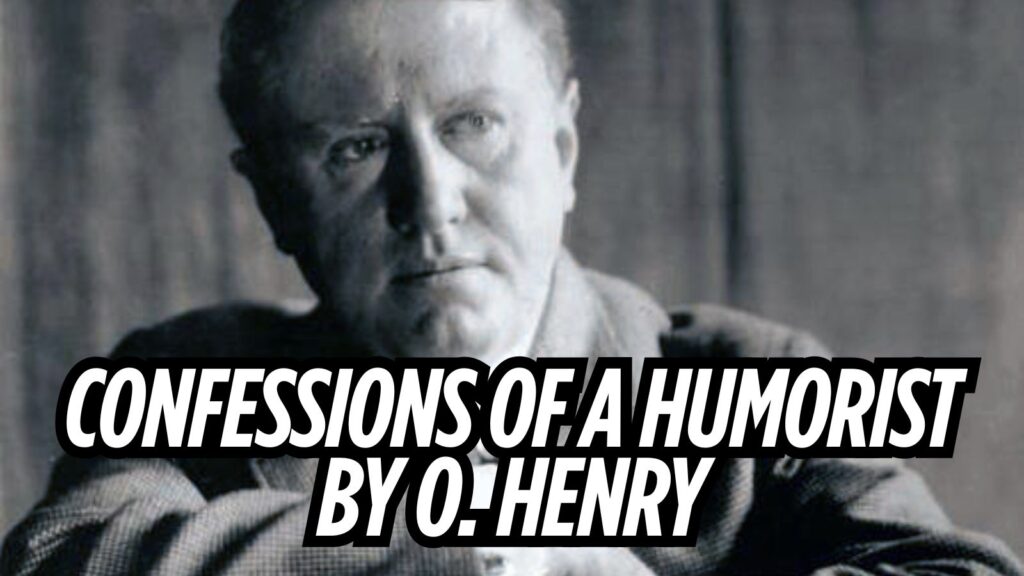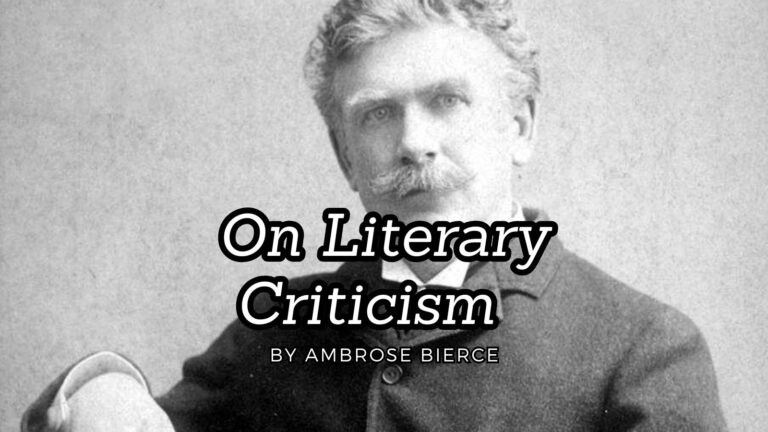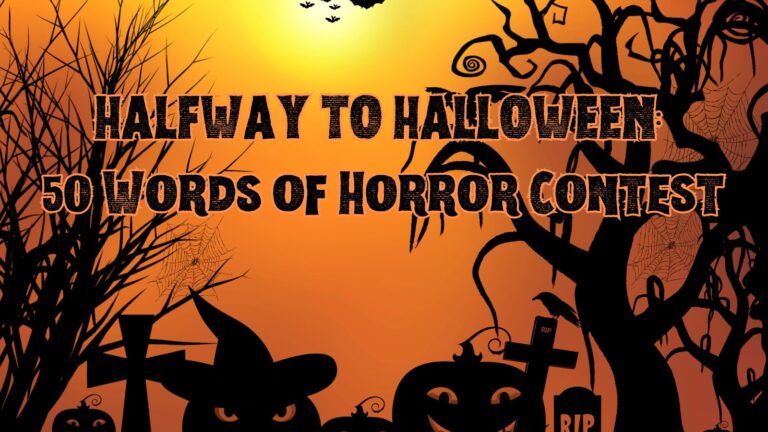Confessions of a Humorist by O. Henry
Originally published August 20, 2010 | Updated April 4, 2025
Introduction: When Humor Becomes a Business
Ever notice how the funniest people often have the most serious stories to tell? O. Henry’s “Confessions of a Humorist” might just be the most hilariously depressing—or perhaps depressingly hilarious—cautionary tale ever penned about turning creativity into commerce.
Written by a man who knew a thing or two about life’s ironies, this story serves up O. Henry’s trademark wit alongside a surprisingly modern warning: be careful what you monetize, lest you kill the very joy that made it valuable in the first place. Long before social media influencers burned out creating “content” or writers developed “newsletter fatigue,” O. Henry was documenting the soul-crushing potential of transforming spontaneous creativity into scheduled production.
Our unnamed narrator’s descent from beloved local wit to family-spying humor vampire feels both uncomfortably familiar and timelessly funny. After all, who hasn’t felt the pressure to “perform” their personality once people come to expect it? (Though most of us draw the line at hiding in piles of autumn leaves to eavesdrop on our children.)
Perhaps the most delicious irony is that O. Henry himself—born William Sydney Porter—wrote this story while churning out precisely the kind of deadline-driven humor and twist endings that his fictional narrator struggles to produce. Published in 1903, this story offers both a self-deprecating wink from a master of the short story form and a genuine reflection on the price of commodifying one’s natural gifts.
So settle in for a tale that might have you laughing, wincing in recognition, or—in true O. Henry fashion—doing both simultaneously.
Confessions of a Humorist by O.Henry
There was a painless stage of incubation that lasted twenty-five years, and then it broke out on me, and people said I was It.
But they called it humor instead of measles.
The employees in the store bought a silver inkstand for the senior partner on his fiftieth birthday. We crowded into his private office to present it. I had been selected for spokesman, and I made a little speech that I had been preparing for a week.
It made a hit. It was full of puns and epigrams and funny twists that brought down the house—which was a very solid one in the wholesale hardware line. Old Marlowe himself actually grinned, and the employees took their cue and roared.
My reputation as a humorist dates from half-past nine o’clock on that morning. For weeks afterward my fellow clerks fanned the flame of my self-esteem. One by one they came to me, saying what an awfully clever speech that was, old man, and carefully explained to me the point of each one of my jokes.
Gradually I found that I was expected to keep it up. Others might speak sanely on business matters and the day’s topics, but from me something gamesome and airy was required.
I was expected to crack jokes about the crockery and lighten up the granite ware with persiflage. I was second bookkeeper, and if I failed to show up a balance sheet without something comic about the footings or could find no cause for laughter in an invoice of plows, the other clerks were disappointed. By degrees my fame spread, and I became a local “character.” Our town was small enough to make this possible. The daily newspaper quoted me. At social gatherings I was indispensable.
I believe I did possess considerable wit and a facility for quick and spontaneous repartee. This gift I cultivated and improved by practice. And the nature of it was kindly and genial, not running to sarcasm or offending others. People began to smile when they saw me coming, and by the time we had met I generally had the word ready to broaden the smile into a laugh.
I had married early. We had a charming boy of three and a girl of five. Naturally, we lived in a vine-covered cottage, and were happy. My salary as bookkeeper in the

hardware concern kept at a distance those ills attendant upon superfluous wealth.
At sundry times I had written out a few jokes and conceits that I considered peculiarly happy, and had sent them to certain periodicals that print such things. All of them had been instantly accepted. Several of the editors had written to request further contributions.
One day I received a letter from the editor of a famous weekly publication. He suggested that I submit to him a humorous composition to fill a column of space; hinting that he would make it a regular feature of each issue if the work proved satisfactory. I did so, and at the end of two weeks he offered to make a contract with me for a year at a figure that was considerably higher than the amount paid me by the hardware firm.
I was filled with delight. My wife already crowned me in her mind with the imperishable evergreens of literary success. We had lobster croquettes and a bottle of blackberry wine for supper that night. Here was the chance to liberate myself from drudgery. I talked over the matter very seriously with Louisa. We agreed that I must resign my place at the store and devote myself to humor.
I resigned. My fellow clerks gave me a farewell banquet. The speech I made there coruscated. It was printed in full by the Gazette. The next morning I awoke and looked at the clock.
“Late, by George!” I exclaimed, and grabbed for my clothes. Louisa reminded me that I was no longer a slave to hardware and contractors’ supplies. I was now a professional humorist.
After breakfast she proudly led me to the little room off the kitchen. Dear girl! There was my table and chair, writing pad, ink, and pipe tray. And all the author’s trappings—the celery stand full of fresh roses and honeysuckle, last year’s calendar on the wall, the dictionary, and a little bag of chocolates to nibble between inspirations. Dear girl!
I sat me to work. The wall paper is patterned with arabesques or odalisks or—perhaps—it is trapezoids. Upon one of the figures I fixed my eyes. I bethought me of humor.
A voice startled me—Louisa’s voice.
“If you aren’t too busy, dear,” it said, “come to dinner.”
I looked at my watch. Yes, five hours had been gathered in by the grim scytheman. I went to dinner.
“You mustn’t work too hard at first,” said Louisa. “Goethe—or was it Napoleon?—said five hours a day is enough for mental labor. Couldn’t you take me and the children to the woods this afternoon?”
“I am a little tired,” I admitted. So we went to the woods.
But I soon got the swing of it. Within a month I was turning out copy as regular as shipments of hardware.
And I had success. My column in the weekly made some stir, and I was referred to in a gossipy way by the critics as something fresh in the line of humorists. I augmented my income considerably by contributing to other publications.
I picked up the tricks of the trade. I could take a funny idea and make a two-line joke of it, earning a dollar. With false whiskers on, it would serve up cold as a quatrain, doubling its producing value. By turning the skirt and adding a ruffle of rhyme you would hardly recognize it as vers de societe with neatly shod feet and a fashion-plate illustration.
I began to save up money, and we had new carpets, and a parlor organ. My townspeople began to look upon me as a citizen of some consequence instead of the merry trifler I had been when I clerked in the hardware store.
After five or six months the spontaniety seemed to depart from my humor. Quips and droll sayings no longer fell carelessly from my lips. I was sometimes hard run for material. I found myself listening to catch available ideas from the conversation of my friends. Sometimes I chewed my pencil and gazed at the wall paper for hours trying to build up some gay little bubble of unstudied fun.
And then I became a harpy, a Moloch, a Jonah, a vampire, to my acquaintances. Anxious, haggard, greedy, I stood among them like a veritable killjoy. Let a bright saying, a witty comparison, a piquant phrase fall from their lips and I was after it like a hound springing upon a bone. I dared not trust my memory; but, turning aside guiltily and meanly, I would make a note of it in my ever-present memorandum book or upon my cuff for my own future use.
My friends regarded me in sorrow and wonder. I was not the same man. Where once I had furnished them entertainment and jollity, I now preyed upon them. No jests from me ever bid for their smiles now. They were too precious. I could not afford to dispense gratuitously the means of my livelihood.
I was a lugubrious fox praising the singing of my friends, the crow’s, that they might drop from their beaks the morsels of wit that I coveted.
Nearly every one began to avoid me. I even forgot how to smile, not even paying that much for the sayings I appropriated.
No persons, places, times, or subjects were exempt from my plundering in search of material. Even in church my demoralized fancy went hunting among the solemn aisles and pillars for spoil.
Did the minister give out the long-meter doxology, at once I began: “Doxology—sockdology—sockdolager—meter—meet her.”
The sermon ran through my mental sieve, its precepts filtering unheeded, could I but glean a suggestion of a pun or a bon mot. The solemnest anthems of the choir were but an accompaniment to my thoughts as I conceived new changes to ring upon the ancient comicalities concerning the jealousies of soprano, tenor, and basso.
My own home became a hunting ground. My wife is a singularly feminine creature, candid, sympathetic, and impulsive. Once her conversation was my delight, and her ideas a source of unfailing pleasure. Now I worked her. She was a gold mine of those amusing but lovable inconsistencies that distinguish the female mind.
I began to market those pearls of unwisdom and humor that should have enriched only the sacred precincts of home. With devilish cunning I encouraged her to talk. Unsuspecting, she laid her heart bare. Upon the cold, conspicuous, common, printed page I offered it to the public gaze.
A literary Judas, I kissed her and betrayed her. For pieces of silver I dressed her sweet confidences in the pantalettes and frills of folly and made them dance in the market place.
Dear Louisa! Of nights I have bent over her cruel as a wolf above a tender lamb, hearkening even to her soft words murmured in sleep, hoping to catch an idea for my next day’s grind. There is worse to come.
God help me! Next my fangs were buried deep in the neck of the fugitive sayings of my little children.
Guy and Viola were two bright fountains of childish, quaint thoughts and speeches. I found a ready sale for this kind of humor, and was furnishing a regular department in a magazine with “Funny Fancies of Childhood.” I began to stalk them as an Indian stalks the antelope. I would hide behind sofas and doors, or crawl on my hands and knees among the bushes in the yard to eavesdrop while they were at play. I had all the qualities of a harpy except remorse.
Once, when I was barren of ideas, and my copy must leave in the next mail, I covered myself in a pile of autumn leaves in the yard, where I knew they intended to come to play. I cannot bring myself to believe that Guy was aware of my hiding place, but even if he was, I would be loath to blame him for his setting fire to the leaves, causing the destruction of my new suit of clothes, and nearly cremating a parent.
Soon my own children began to shun me as a pest. Often, when I was creeping upon them like a melancholy ghoul, I would hear them say to each other: “Here comes papa,” and they would gather their toys and scurry away to some safer hiding place. Miserable wretch that I was!
And yet I was doing well financially. Before the first year had passed I had saved a thousand dollars, and we had lived in comfort.
But at what a cost! I am not quite clear as to what a pariah is, but I was everything that it sounds like. I had no friends, no amusements, no enjoyment of life. The happiness of my family had been sacrificed. I was a bee, sucking sordid honey from life’s fairest flowers, dreaded and shunned on account of my stingo.
One day a man spoke to me, with a pleasant and friendly smile. Not in months had the thing happened. I was passing the undertaking establishment of Peter Heffelbower. Peter stood in the door and saluted me. I stopped, strangely wrung in my heart by his greeting. He asked me inside.
The day was chill and rainy. We went into the back room, where a fire burned, in a little stove. A customer came, and Peter left me alone for a while. Presently I felt a new feeling stealing over me—a sense of beautiful calm and content, I looked around the place. There were rows of shining rosewood caskets, black palls, trestles, hearse plumes, mourning streamers, and all the paraphernalia of the solemn trade. Here was peace, order, silence, the abode of grave and dignified reflections. Here, on the brink of life, was a little niche pervaded by the spirit of eternal rest.
When I entered it, the follies of the world abandoned me at the door. I felt no inclination to wrest a humorous idea from those sombre and stately trappings. My mind seemed to stretch itself to grateful repose upon a couch draped with gentle thoughts.
A quarter of an hour ago I was an abandoned humorist. Now I was a philosopher, full of serenity and ease. I had found a refuge from humor, from the hot chase of the shy quip, from the degrading pursuit of the panting joke, from the restless reach after the nimble repartee.
I had not known Heffelbower well. When he came back, I let him talk, fearful that he might prove to be a jarring note in the sweet, dirgelike harmony of his establishment.
But, no. He chimed truly. I gave a long sigh of happiness. Never have I known a man’s talk to be as magnificently dull as Peter’s was. Compared with it the Dead Sea is a geyser. Never a sparkle or a glimmer of wit marred his words. Commonplaces as trite and as plentiful as blackberries flowed from his lips no more stirring in quality than a last week’s tape running from a ticker. Quaking a little, I tried upon him one of my best pointed jokes. It fell back ineffectual, with the point broken. I loved that man from then on.
Two or three evenings each week I would steal down to Heffelbower’s and revel in his back room. That was my only joy. I began to rise early and hurry through my work, that I might spend more time in my haven. In no other place could I throw off my habit of extracting humorous ideas from my surroundings. Peter’s talk left me no opening had I besieged it ever so hard.
Under this influence I began to improve in spirits. It was the recreation from one’s labor which every man needs. I surprised one or two of my former friends by throwing them a smile and a cheery word as I passed them on the streets. Several times I dumfounded my family by relaxing long enough to make a jocose remark in their presence.
I had so long been ridden by the incubus of humor that I seized my hours of holiday with a schoolboy’s zest.
Mv work began to suffer. It was not the pain and burden to me that it had been. I often whistled at my desk, and wrote with far more fluency than before. I accomplished my tasks impatiently, as anxious to be off to my helpful retreat as a drunkard is to get to his tavern.
My wife had some anxious hours in conjecturing where I spent my afternoons. I thought it best not to tell her; women do not understand these things. Poor girl!—she had one shock out of it.
One day I brought home a silver coffin handle for a paper weight and a fine, fluffy hearse plume to dust my papers with.
I loved to see them on my desk, and think of the beloved back room down at Heffelbower’s. But Louisa found them, and she shrieked with horror. I had to console her with some lame excuse for having them, but I saw in her eyes that the prejudice was not removed. I had to remove the articles, though, at double-quick time.
One day Peter Heffelbower laid before me a temptation that swept me off my feet. In his sensible, uninspired way he showed me his books, and explained that his profits and his business were increasing rapidly. He had thought of taking in a partner with some cash. He would rather have me than any one he knew. When I left his place that afternoon Peter had my check for the thousand dollars I had in the bank, and I was a partner in his undertaking business.
I went home with feelings of delirious joy, mingled with a certain amount of doubt. I was dreading to tell my wife about it. But I walked on air. To give up the writing of humorous stuff, once more to enjoy the apples of life, instead of squeezing them to a pulp for a few drops of hard cider to make the pubic feel funny—what a boon that would be!
At the supper table Louisa handed me some letters that had come during my absence. Several of them contained rejected manuscript. Ever since I first began going to Heffelbower’s my stuff had been coming back with alarming frequency. Lately I had been dashing off my jokes and articles with the greatest fluency. Previously I had labored like a bricklayer, slowly and with agony.
Presently I opened a letter from the editor of the weekly with which I had a regular contract. The checks for that weekly article were still our main dependence. The letter ran thus:
DEAR SIR:
As you are aware, our contract for the year expires with the present month. While regretting the necessity for so doing, we must say that we do not care to renew same for the coming year. We were quite pleased with your style of humor, which seems to have delighted quite a large proportion of our readers. But for the past two months we have noticed a decided falling off in its quality. Your earlier work showed a spontaneous, easy, natural flow of fun and wit. Of late it is labored, studied, and unconvincing, giving painful evidence of hard toil and drudging mechanism.
Again regretting that we do not consider your contributions available any longer, we are, yours sincerely,
THE EDITOR.
I handed this letter to my wife. After she had read it her face grew extremely long, and there were tears in her eyes.
“The mean old thing!” she exclaimed indignantly. “I’m sure your pieces are just as good as they ever were. And it doesn’t take you half as long to write them as it did.” And then, I suppose, Louisa thought of the checks that would cease coming. “Oh, John,” she wailed, “what will you do now?”
For an answer I got up and began to do a polka step around the supper table. I am sure Louisa thought the trouble had driven me mad; and I think the children hoped it had, for they tore after me, yelling with glee and emulating my steps. I was now something like their old playmate as of yore.
“The theatre for us to-night!” I shouted; “nothing less. And a late, wild, disreputable supper for all of us at the Palace Restaurant. Lumpty-diddle-de-dee-de-dum!”
And then I explained my glee by declaring that I was now a partner in a prosperous undertaking establishment, and that written jokes might go hide their heads in sackcloth and ashes for all me.
With the editor’s letter in her hand to justify the deed I had done, my wife could advance no objections save a few mild ones based on the feminine inability to appreciate a good thing such as the little back room of Peter Hef—no, of Heffelbower & Co’s. undertaking establishment.
In conclusion, I will say that to-day you will find no man in our town as well liked, as jovial, and full of merry sayings as I. My jokes are again noised about and quoted; once more I take pleasure in my wife’s confidential chatter without a mercenary thought, while Guy and Viola play at my feet distributing gems of childish humor without fear of the ghastly tormentor who used to dog their steps, notebook in hand.
Our business has prospered finely. I keep the books and look after the shop, while Peter attends to outside matters. He says that my levity and high spirits would simply turn any funeral into a regular Irish wake.
Why This Story Matters Today: The Creator Economy Through O. Henry’s Eyes
Though written in 1903, “Confessions of a Humorist” reads like it could have been penned yesterday as a viral Medium article about creator burnout. In our digital age where content creation has become both democratized and commodified, O. Henry’s cautionary tale resonates with startling clarity. Here’s why this story remains remarkably relevant:
The Monetization Trap
Today’s YouTubers, TikTok creators, and social media influencers might recognize themselves in O. Henry’s narrator. What begins as authentic expression (“I believe I did possess considerable wit and a facility for quick and spontaneous repartee”) transforms into a calculated performance once it becomes a source of income. The modern creator who starts posting videos for fun, only to become trapped by sponsorship obligations and algorithm demands, is living the same narrative arc.
The Content Treadmill
“I began to be hardpressed for material,” laments our narrator, describing the relentless pressure of regular deadlines that hasn’t changed in 120 years. Today’s newsletter writers, podcasters, and bloggers face identical stressors—the constant need to produce, to meet audience expectations, and to maintain the output that pays the bills. Content creation becomes less about inspiration and more about perspiration.
Exploiting Personal Relationships
Perhaps most disturbing is how the narrator begins to view his family not as loved ones but as material sources: “A literary Judas, I kissed her and betrayed her. For pieces of silver I dressed her sweet confidences in the pantalettes and frills of folly.” This mirrors today’s family vloggers, parenting influencers, and relationship podcasters who must navigate the ethical quicksand of monetizing personal connections.
Authenticity vs. Performance
The story brilliantly captures how the pressure to create makes everything—even sacred moments—potential fodder: “Even in church my demoralized fancy went hunting among the solemn aisles and pillars for spoil.” Modern creators similarly speak of never being fully present, always viewing experiences through the lens of “Could this be content?”
Burnout and Creative Death
- Henry understood that forcing creativity kills it. The narrator’s once-spontaneous humor becomes “labored, studied, and unconvincing” according to his editor. This creative burnout parallels what many YouTubers, writers, and artists describe after years on the content treadmill—the death of the very spark that made their work valuable.
Finding Salvation
Intriguingly, the narrator finds peace by stepping away from his monetized skill—just as many burned-out creators today report feeling reborn after quitting platforms, taking extended breaks, or pivoting to less demanding creative outlets. His unlikely sanctuary in an undertaker’s establishment mirrors the counterintuitive solutions many find when seeking refuge from creative pressure.
The Ultimate Warning
The story serves as a timeless warning about the dangers of commodifying natural gifts. Whether you’re a 19th-century humor writer or a 21st-century content creator, the lesson remains: when creativity becomes solely transactional, something essential dies. As one of the earliest literary examinations of creative burnout in commercial media, O. Henry’s story documented a problem that has only intensified with each technological innovation.
In an era where “creator burnout” has become a recognized psychological phenomenon and platform algorithms demand ever-increasing output, “Confessions of a Humorist” isn’t just relevant—it’s prophetic. O. Henry couldn’t have imagined TikTok, Substack, or YouTube, but he understood perfectly the human cost of turning one’s natural expressions into products. Perhaps that’s why, over a century later, his story still makes us both laugh and wince in recognition.
What Writers Can Learn from “Confessions of a Humorist”
While the previous section examined how this story mirrors today’s creator economy, O. Henry offers particularly valuable lessons for those who put words on the page professionally. Beyond its entertainment value, “Confessions of a Humorist” serves as both a technical masterclass and a professional survival guide for writers. Here’s what today’s wordsmiths can glean from this century-old gem:
The Craft of Self-Aware Humor
- Henry demonstrates the power of self-deprecating meta-commentary. Through his narrator, he creates a story about writing humor that is itself genuinely funny—a challenging technical feat. Writers can study how he maintains this delicate balance, using the very techniques the narrator claims are failing him. It’s a masterclass in writing about writing without becoming tedious.
The Economics of Creative Writing
“Before the first year had passed I had saved a thousand dollars, and we had lived in comfort. But at what a cost!” This story offers a remarkably accurate portrait of freelance economics that remains relevant. O. Henry captures the financial calculations writers still make: higher-paying work that drains your creative reserves versus more fulfilling work that may pay less.
Repurposing and Recycling Content
The narrator’s confession that “I could take a funny idea and make a two-line joke of it, earning a dollar. With false whiskers on, it would serve up cold as a quatrain…” offers a surprisingly modern look at content repurposing. Today’s writers still practice versions of this—turning articles into newsletters, newsletters into podcasts, Twitter threads into essays.
The Danger of Niches
Getting pigeonholed is a perennial writer’s problem. The narrator becomes “the humorist,” expected always to perform the same function—much like writers today who become branded as the “tech guy” or the “relationship expert” and struggle to break free. O. Henry warns about the creative limitations of becoming too strongly associated with a single type of writing.
Maintaining Creative Reserves
Perhaps most valuable is O. Henry’s insight into creative sustainability. The narrator’s depletion comes from treating every moment as potential material, never refilling his creative well. Modern writers face the same challenge—the pressure to constantly produce can prevent the very experiences that generate good writing.
The Editor-Writer Relationship
The editor’s letter near the story’s end (“Your earlier work showed a spontaneous, easy, natural flow… Of late it is labored, studied, and unconvincing”) could appear in a rejection email today. O. Henry captures the sometimes brutal clarity of editorial feedback and the painful recognition when it rings true.
Finding Your Heffelbower’s Back Room
Every writer needs what the narrator finds in the undertaker’s back room—a place where professional pressure disappears and creative joy can return. O. Henry understood the necessity of creative sanctuaries where one can exist without the burden of performance or monetization. For today’s writers, identifying your equivalent of “Heffelbower’s back room” might be the difference between longevity and burnout.
The Career Pivot
The narrator’s ultimate solution—becoming an undertaker’s business partner—offers an unexpected lesson about creative careers. Sometimes the healthiest choice for your creativity might be to stop demanding that it pay your bills. Many successful writers today maintain separate careers precisely to avoid the pressure our narrator faces.
For writers navigating today’s complex publishing landscape—balancing social media platforms, newsletter subscriptions, freelance gigs, and book contracts—O. Henry’s story serves as both warning and guide. It reminds us that the challenges of making a living through words are not new, and that protecting one’s creative spark has always required vigilance, self-awareness, and occasionally, radical solutions. The humorist may have written his confession in 1903, but for writers today, it reads like essential advice from a particularly insightful mentor.
O. Henry: The Man Behind the Pseudonym
- Henry, born William Sidney Porter (1862-1910), lived a life that could have been pulled from the pages of his own fiction—complete with plot twists, reversals of fortune, and an ironic ending.
Born in Greensboro, North Carolina, Porter worked as a pharmacist, ranch hand, bank teller, and journalist before his most unexpected career change: convicted embezzler. After allegedly misappropriating funds at the First National Bank of Austin, Texas, he fled to Honduras, only returning when his wife became terminally ill. He was subsequently convicted and sentenced to five years in an Ohio penitentiary.
It was behind bars that Porter truly became O. Henry. During his three-year imprisonment (1898-1901), he published his first short stories under this pseudonym, concealing his incarceration from editors and readers alike. His time in prison provided him with a wealth of characters and a deep empathy for society’s underdogs that would characterize his later work.
Upon his release, O. Henry moved to New York City, where he produced nearly 300 stories in just eight years. Writing at a feverish pace (often one story per week), he became famous for his witty narrative voice, surprise endings, and warm portrayals of ordinary people. His most beloved works include “The Gift of the Magi,” “The Ransom of Red Chief,” and “The Cop and the Anthem.”
Despite his literary success, O. Henry’s personal life remained troubled. He struggled with alcoholism, financial problems, and ill health. In an ending worthy of his own ironic tales, this master storyteller died nearly penniless at age 47, leaving behind an unfinished novel and a literary legacy that far outshone his personal trials.
- Henry’s immense popularity led to the O. Henry Award, established in 1919 and still one of America’s most prestigious annual prizes for short fiction. His impact on the short story form—particularly his trademark twist endings—has been so profound that the term “O. Henry ending” entered the literary lexicon, ensuring that William Sidney Porter would be remembered not by his given name, but by the persona he created with pen and paper
Further Reading: Exploring More of O. Henry’s World
If “Confessions of a Humorist” has piqued your interest in O. Henry’s work, you’re in for a treat. With nearly 300 published stories, there’s plenty more to discover. Here’s where to continue your exploration:
Essential O. Henry Stories
- “The Gift of the Magi” – Perhaps his most famous work, this Christmas tale of sacrifice and love showcases O. Henry’s talent for heartwarming irony.
- “The Ransom of Red Chief” – A comedic masterpiece where two kidnappers get more than they bargained for when they abduct a mischievous boy.
- “The Last Leaf” – A moving story of sacrifice, art, and illusion set in Greenwich Village.
- “The Cop and the Anthem” – Follow Soapy, a homeless man trying desperately to get arrested to secure winter shelter, only to face O. Henry’s trademark twist of fate.
- “A Retrieved Reformation” – The tale of safecracker Jimmy Valentine’s attempt to reform, which demonstrates O. Henry’s sympathy for criminals and outsiders.
Stories With Similar Themes to “Confessions of a Humorist”
- “The Duplicity of Hargraves” – Another story about a man who mines his personal connections for professional gain.
- “Whistling Dick’s Christmas Stocking” – Features characters who reject conventional success for more authentic living.
- “The Poet and the Peasant” – Explores the gap between artistic aspirations and everyday reality.
Collections to Seek Out
- “The Four Million” (1906) – O. Henry’s first major collection, focusing on ordinary New Yorkers.
- “Heart of the West” (1907) – Stories set in Texas and the American West, drawing on his experiences there.
- “The Voice of the City” (1908) – More New York stories capturing the diversity and energy of urban life.
For the Dedicated Reader
- “Selected Stories of O. Henry” – Various publishers offer selected works, often with helpful introductions placing his stories in context.
- “O. Henry: 100 Selected Stories” – A comprehensive introduction to the breadth of his work.
Digital Resources
- The Project Gutenberg O. Henry Collection offers free access to much of his work in the public domain.
- The American Literature Archive features many of his stories in easy-to-read format.
What makes O. Henry’s stories so enduring is their perfect blend of accessibility and craft. You can enjoy them simply as entertaining tales with surprising endings, or study them as masterclasses in narrative efficiency, characterization, and the art of the twist. Either way, “Confessions of a Humorist” is just the beginning of what this remarkable writer has to offer.
- Story Structure: How the Save the Cat! Method Can Transform Your Writing - April 23, 2025
- HALFWAY TO HALLOWEEN: 50 Words of Horror Contest - April 22, 2025
- How to Edit your poetry for beginners and beyond (with worksheet) - April 18, 2025







